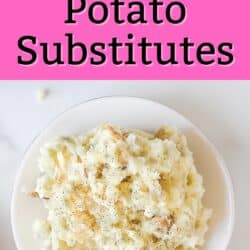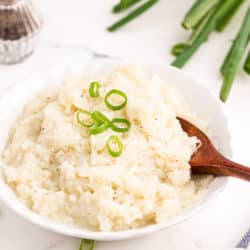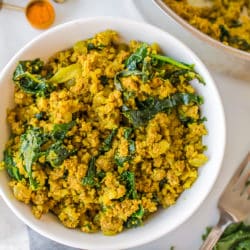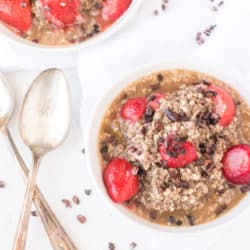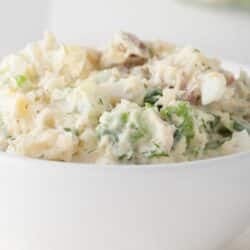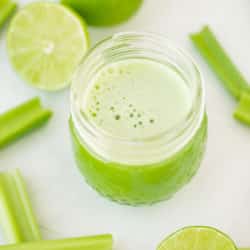8 Best Low Carb Potato Substitutes
Potatoes are carbohydrate-rich root vegetables that are creamy and starchy. If you’re on a low-carb diet, what are the best alternatives to using potatoes when cooking? Find the best low-carb potato substitutes including cauliflower, turnips, kohlrabi, rutabaga, celery root, radishes, butternut squash, and zucchini.

Overview of Potatoes
Nutrition info
Potatoes are a good source of several essential nutrients. For instance, they are an excellent source of potassium.
They also contain vitamin C, which is important for immunity, and fiber, which helps to promote digestive health. They also contain vitamin B6.
Additionally, potatoes are low in calories and fat, making them a relatively healthy food choice.
However, it is important to remember that how you prepare your potatoes can make a big difference in their nutritional value. For example, french fries are high in fat and sodium, while steamed or baked potatoes are much less processed.
How they are served
There are many ways to enjoy potatoes. They can be boiled, steamed, baked, mashed, smashed, and fried. Potatoes can be topped with almost any condiment or topping you can imagine.
For most people, potatoes are a nutritious, delicious, and versatile food that can be enjoyed in many different ways.
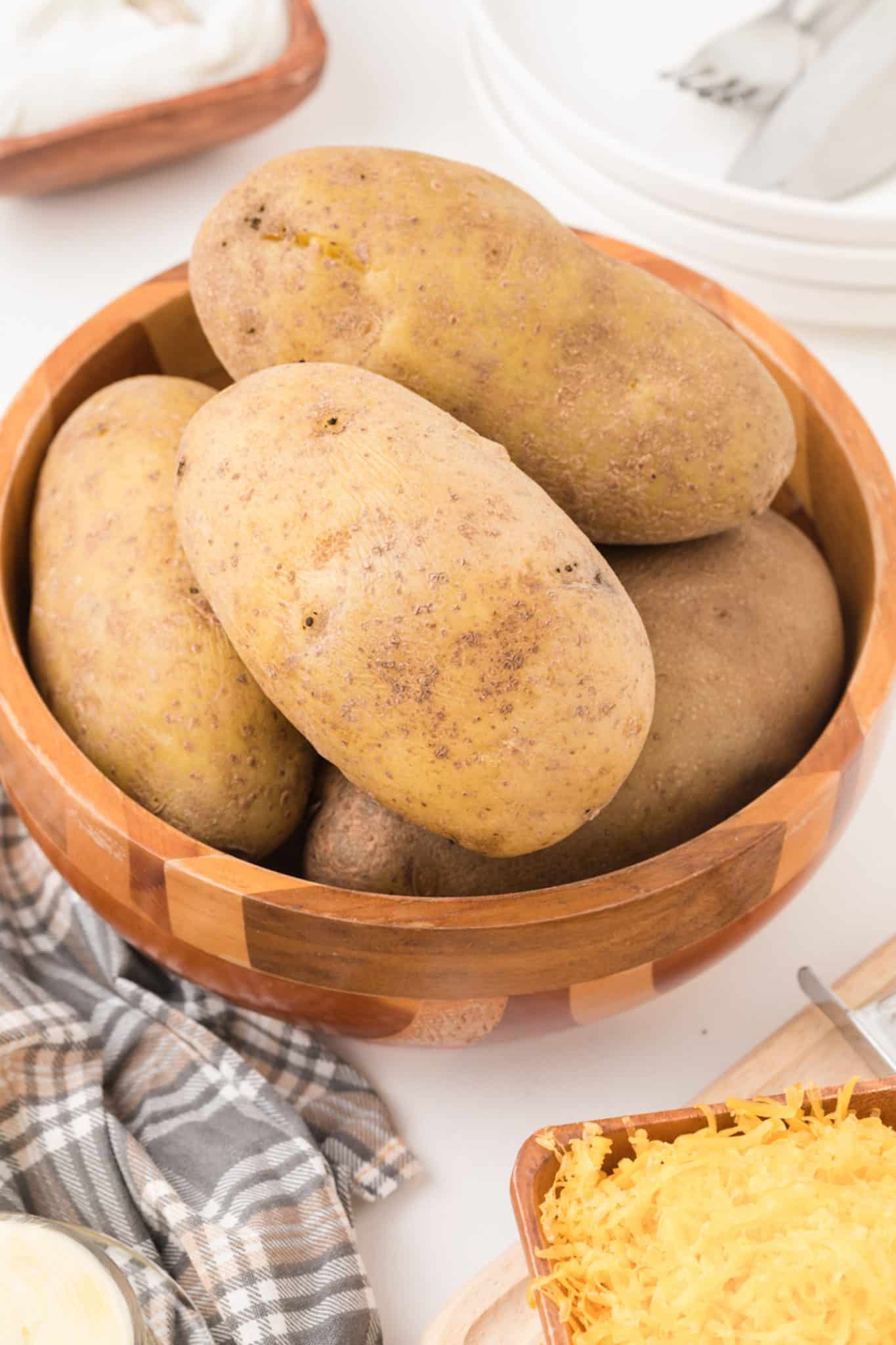
How they are used to thicken soups
Potatoes are a common ingredient in soups and stews, and they can be used to thicken the soup and add body.
There are a few different ways to do this. One way is to add diced potatoes to the soup and cook until they are soft. Another way is to partially mash the potatoes, and then add them to the soup. This will give the soup a thick, creamy texture.
Finally, you can puree the potatoes and add them to the soup. This will make the soup very thick and smooth. If you are using potatoes to thicken the soup, be sure to add extra seasonings to compensate for the bland taste of the potato.
How many carbs do they have?
Potatoes are a very rich source of carbohydrates, providing between 20-30 grams per average-sized potato.
Potatoes are considered a complex carb, which means they are slower to absorb than a refined carbohydrate like flour.
Best Low-Carb Potato Substitutes
If you want or need to follow a keto diet, low carb diet, or lower-carb diet, though, you may be wondering what you can use to substitute white potatoes?
Here are 9 low-carb substitutes for potatoes. Carbs are listed in 100g portions.
1. Cauliflower – 2g of carbs

Cauliflower is an excellent low-carb potato substitute that has fiber and is high in vitamin C. It’s kind of amazing how similar cooked cauliflower can taste to cooked potatoes, especially when mashed.
Cauliflower has a similar texture to potatoes, but it is not as starchy. It’s a low-carb cruciferous vegetable with lots of healthy benefits.
To substitute cauliflower for potatoes, simply steam or roast the cauliflower florets and add them to your dish in place of the potatoes. Substitute cauliflower for potatoes in a 1:1 ratio.
Since cauliflower does not have the same flavor as potatoes, so you may want to season it with salt, pepper, and other spices to taste. I like to use mashed cauliflower in please of potatoes, or I sometimes will substitute half cauliflower with half potatoes to make a lower-carb cauliflower mash with a lower carb count.
You can also make cauliflower rice in a food processor if you want a low-carb alternative for white rice.
See my recipes for Instant Pot Cauliflower Mash, Instant Pot Cauliflower Florets, or Keto Mexican Rice.
2. Turnips – 4g of carbs
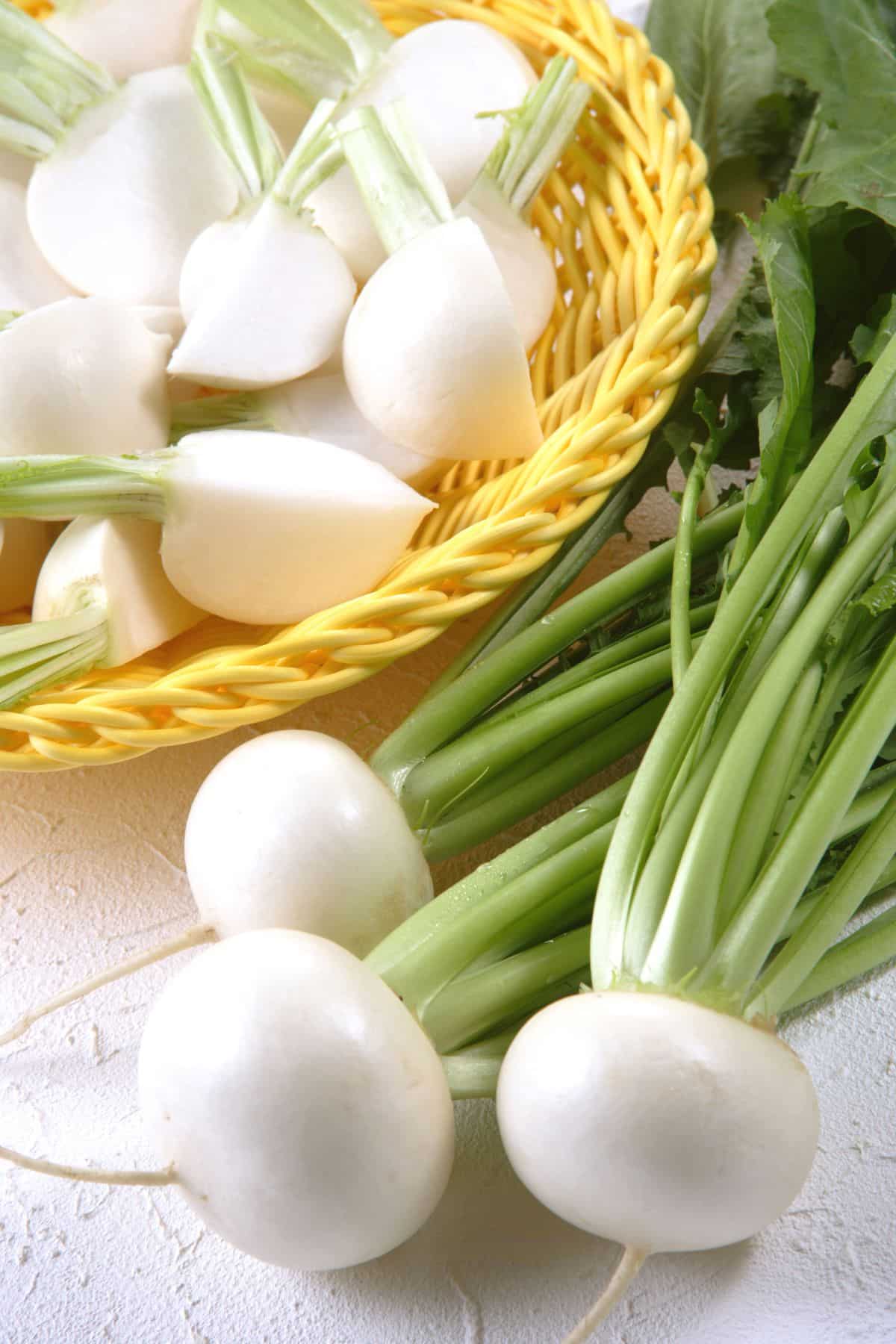
When it comes to low-carb potato substitutes, turnips are a great option.
Turnips have a similar nutritional profile to potatoes, with fewer carbs. They can be used in many of the same ways as potatoes, such as mashed, roasted, or added to soups and stews.
You can find turnips at your local grocery store.
Substitute cooked turnip with cooked potatoes in a 1:1 ratio.
However, turnips have a slightly sweeter flavor than potatoes, so they may not be suitable for all dishes. They have a crunch texture and a bit of a bitter flavor.
3. Kohlrabi – 2g of carbs
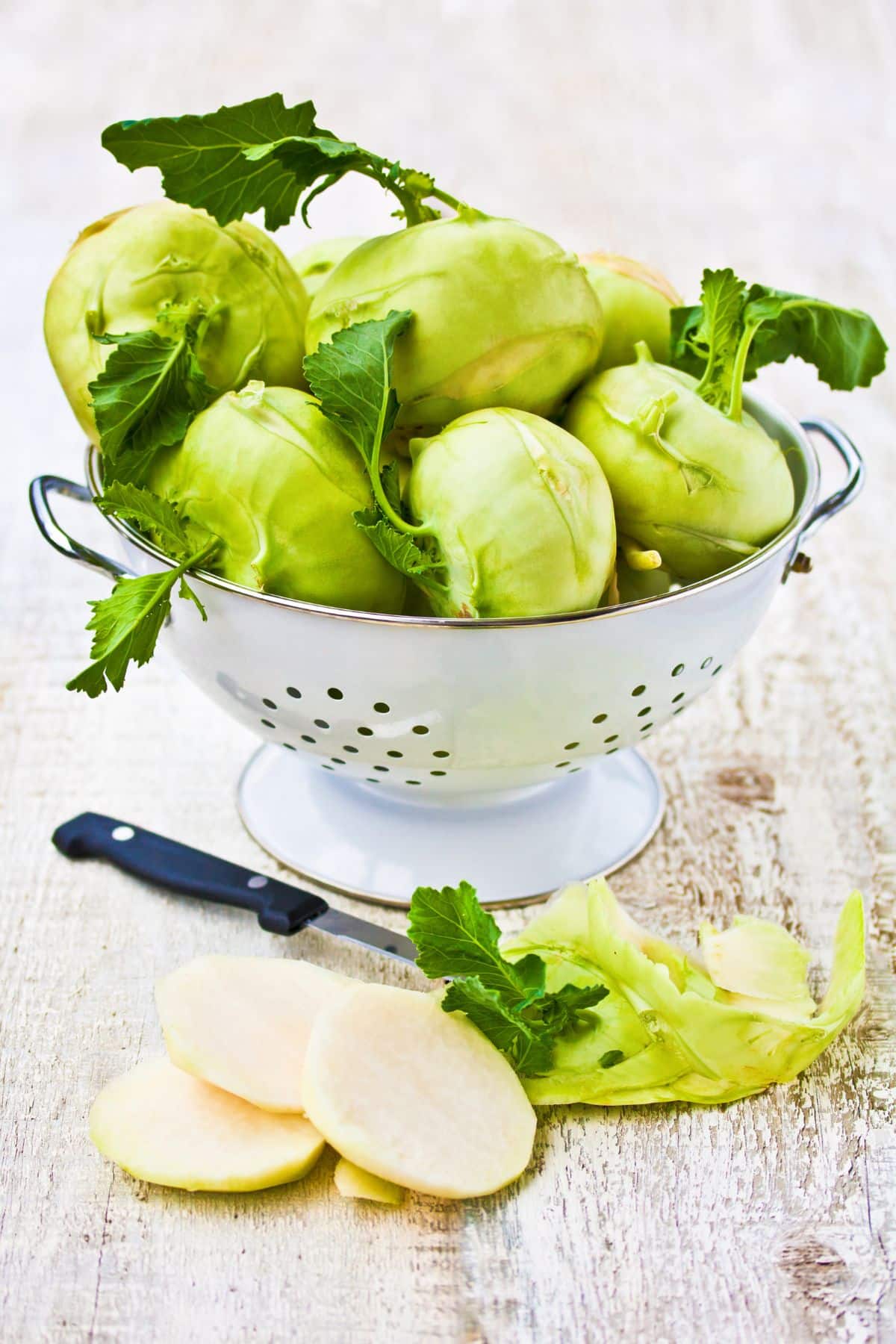
If you’re looking for a low-carb potato substitute, kohlrabi is a great option.
It’s a nutrient-dense vegetable that’s high in fiber and vitamins C and B6. What’s more, it contains just 2 grams of carbs per 100 grams, making it a great choice for those on a low-carb diet.
When substituting kohlrabi for potatoes, you’ll need to peel and dice the vegetable into small pieces. You can then cook it in boiling water or roast it in the oven. Substitute cooked kohlrabi for cooked potatoes in a 1:1 ratio.
While kohlrabi does have a slightly different flavor to potatoes, it makes a great replacement in most dishes. I think it is an excel low-carb alternative.
4. Rutabaga – 5g of carbs
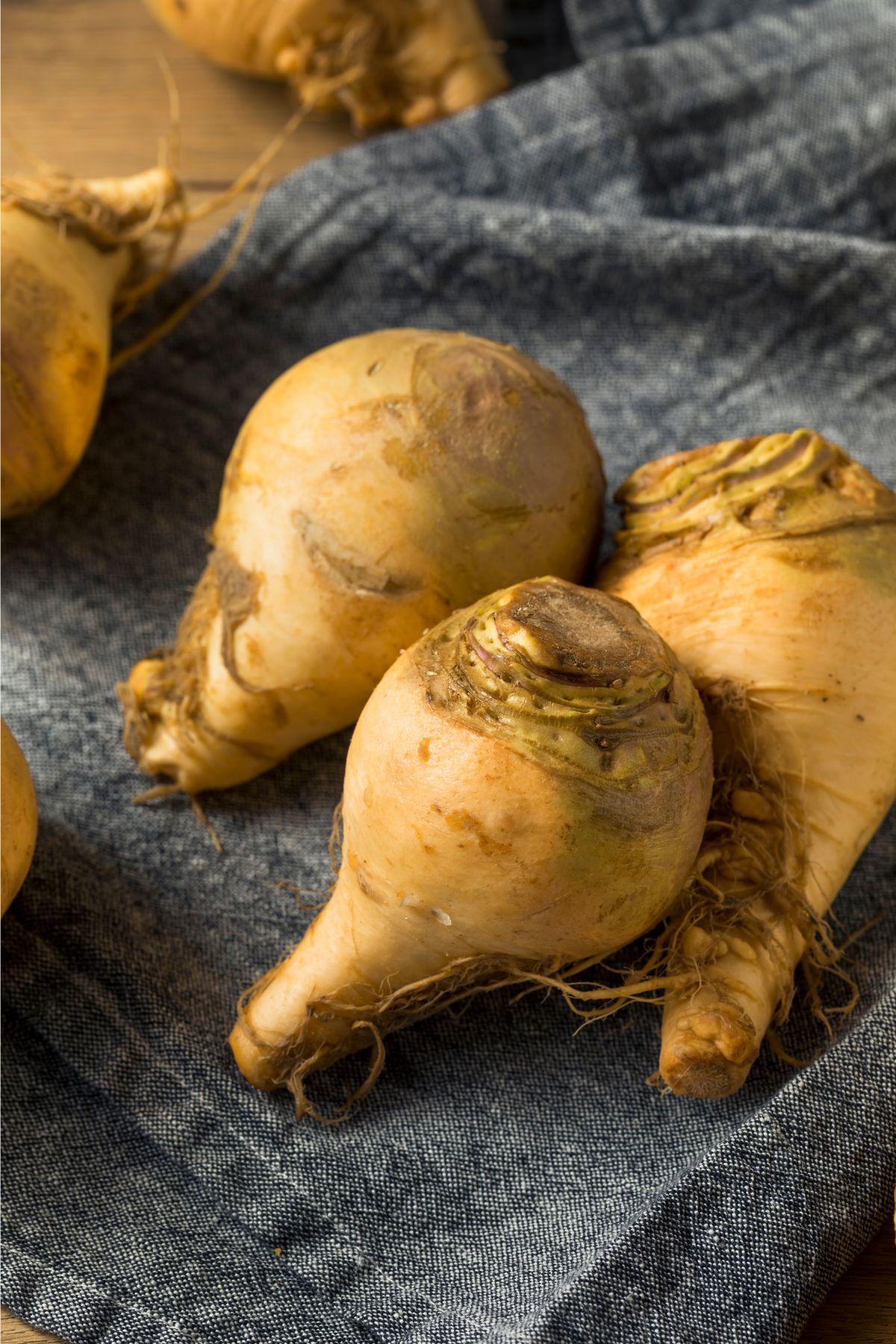
Rutabagas are a great low-carb potato substitute.
Rutabagas can be used in many of the same ways as potatoes, including being boiled, mashed, or roasted. They have a slightly sweeter taste than potatoes, and their flesh is creamy yellow in color.
When substituting rutabagas for potatoes, it is important to keep in mind that they cook more quickly than potatoes. As a result, you may need to adjust your cooking time accordingly.
Try mashed rutabaga in place of potatoes!
Substitute cooked rutabaga for cooked potatoes in a 1:1 ratio.
5. Celery Root – 7g of carbs
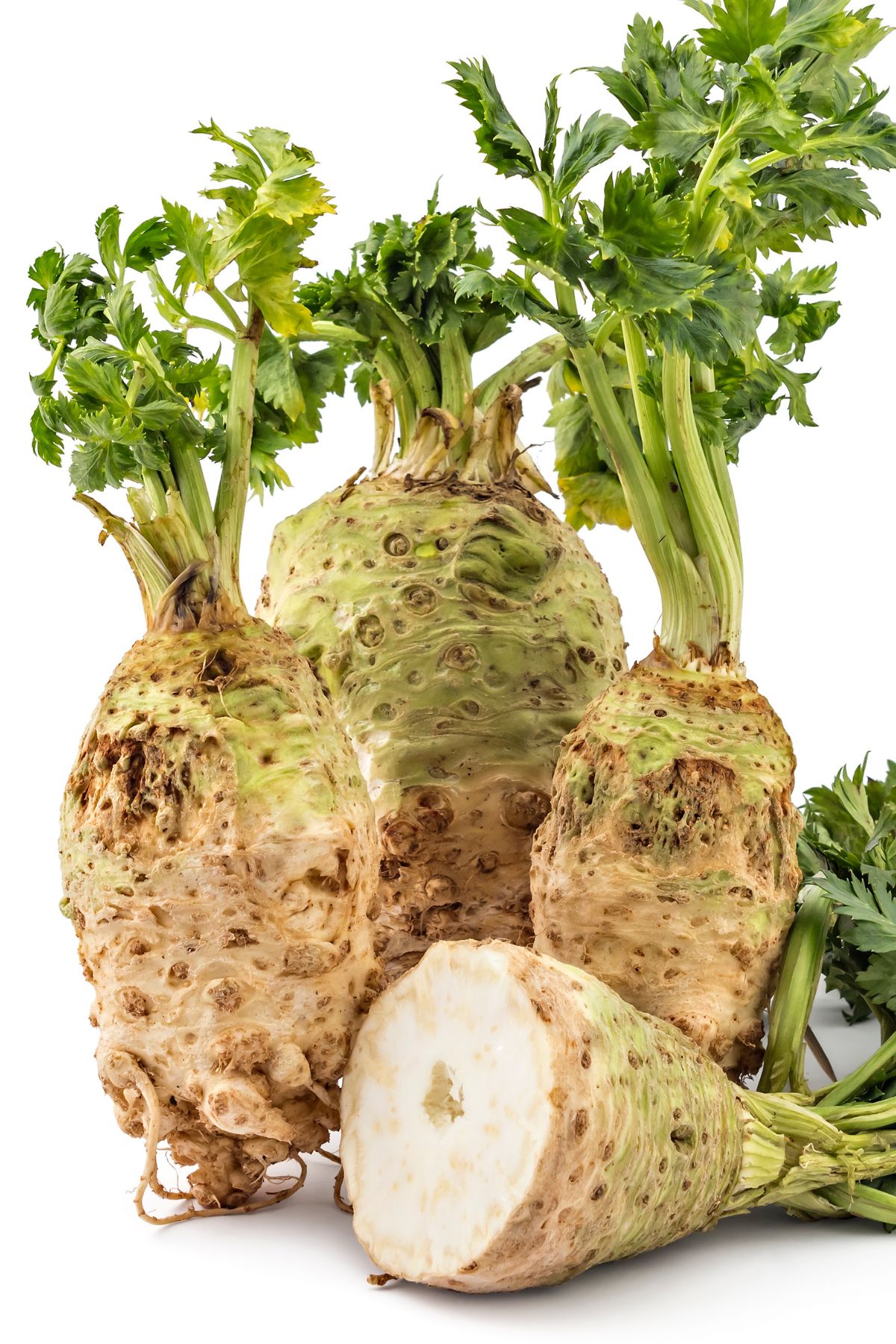
Celery root, also known as Celeriac, has a similar texture to potatoes but is much lower in carbs, making it an ideal choice for those on a low-carb diet.
Celeriac can be used in many of the same ways as potatoes, such as being roasted, mashed, or added to the soup. Substitute cooked celery root for cooked potatoes in a 1:1 ratio.
However, there are some notable differences between the two vegetables. For example, celeriac has a slightly earthly flavor, whereas potatoes are more neutral in taste. Additionally, celeriac is lower in calories than potatoes.
This is a great veggie to try on a ketogenic diet. You’ll get lots of fiber with a mild flavor. It’s a great low-carb vegetable.
6. Radishes – 3.4g of carbs
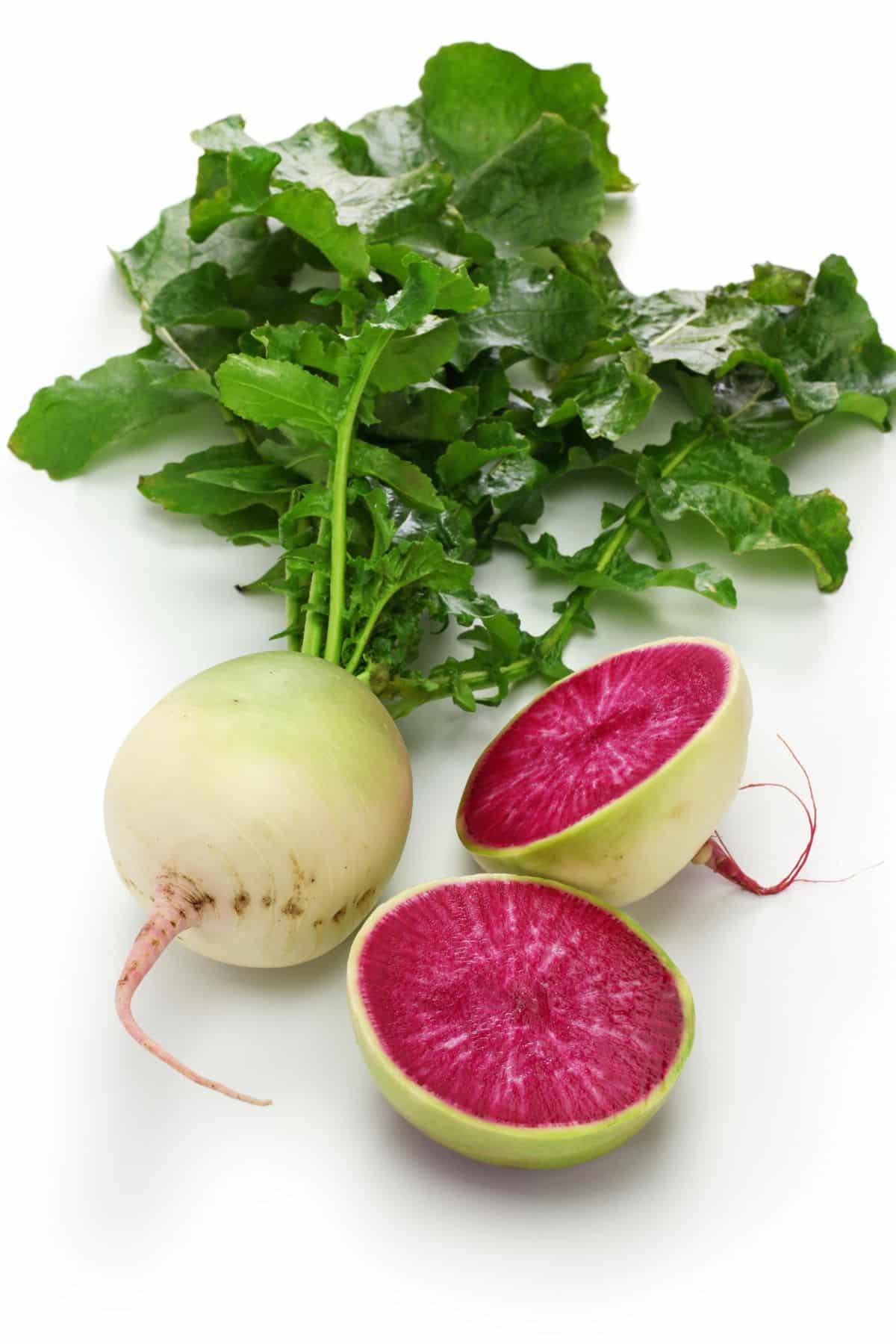
Radishes can be used in many of the same ways as potatoes, including being roasted or added to soups and stews. However, they do have a slightly different flavor than potatoes. Radishes are also a good source of vitamins C.
When substituting radishes for potatoes, it is important to remember that they will cook more quickly than potatoes, so be sure to check on them regularly to avoid over-cooking.
Radishes won’t taste as creamy as traditional potatoes, but you can try subbing them if you want a crunchy texture in your favorite potato dishes.
Substitute cooked radishes for cooked potatoes in a 1:1 ratio.
7. Butternut Squash – 12g of carbs
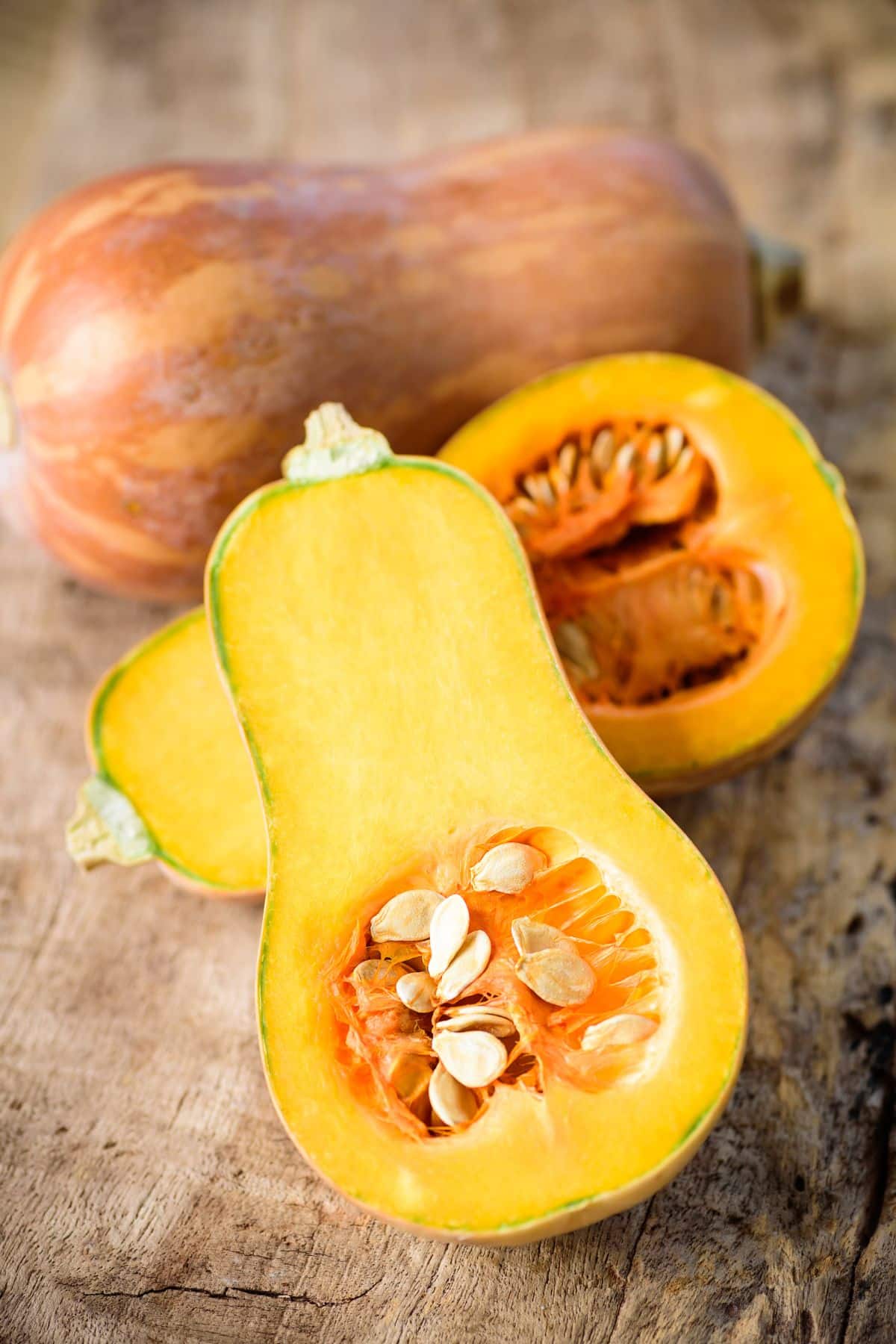
Although is higher in carbs than some other vegetables, butternut squash is a good source of vitamins A and C. It’s also high in potassium, magnesium, and manganese.
When substituting for potatoes, butternut squash can be used in much the same way. It can be roasted, mashed, or even made into french fries. Substitute cooked butternut squash for cooked potatoes in a 1:1 ratio.
While the taste and texture are not identical to potatoes, butternut squash is a delicious alternative that is sure to satisfy your cravings. Plus, squash has a lot of fiber so you’ll have fewer grams of net carbs.
8. Zucchini – 2g of carbs
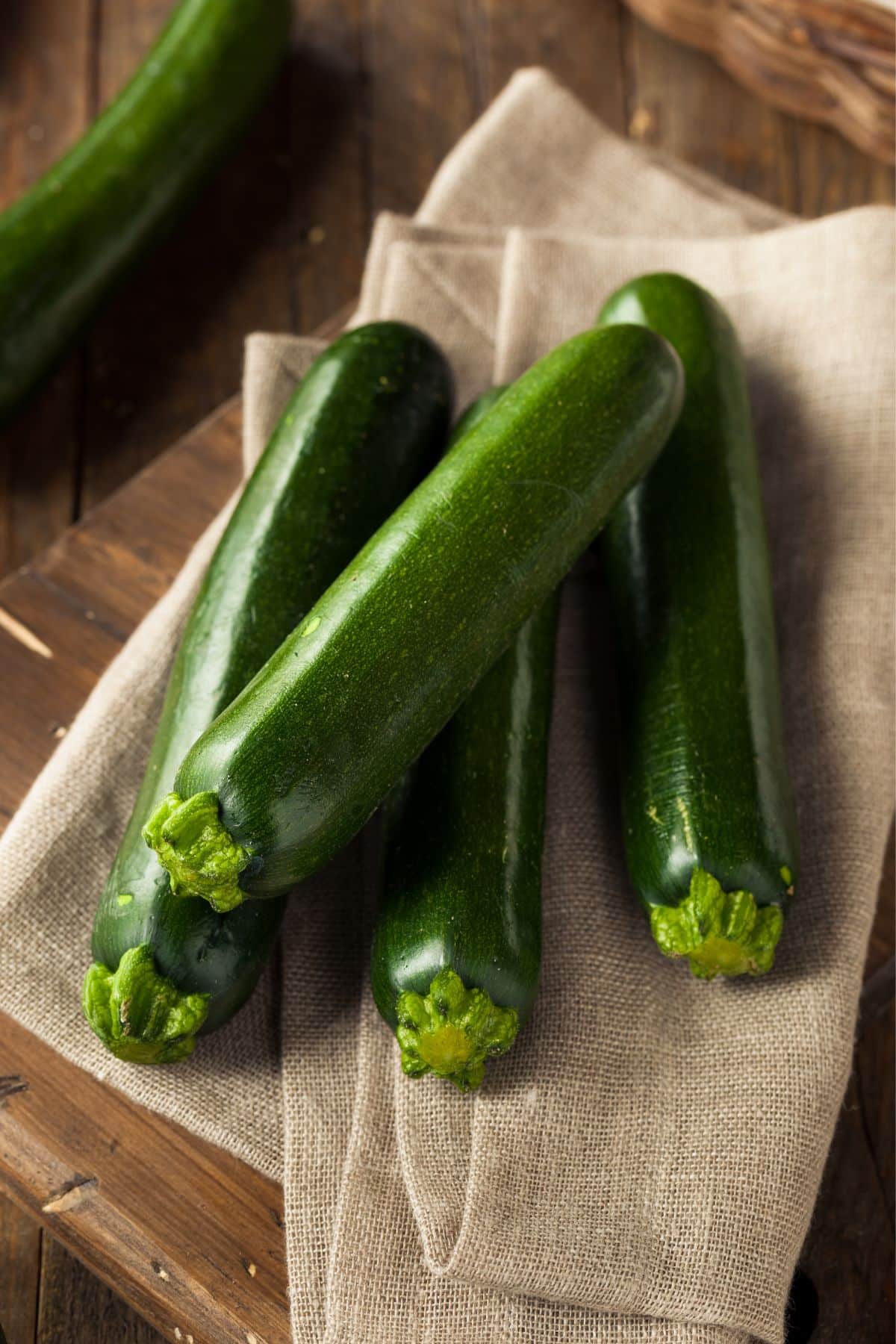
Although it is lower in carbs than potatoes, zucchini is high in fiber, vitamin B6 and antioxidants. To substitute zucchini for potatoes, simply use it in place of the potato called for in the recipe.
For example, if a recipe calls for two cups of diced potatoes, use two cups of diced zucchini instead.
When substituting zucchini for potatoes, keep in mind that it will have a different texture than potatoes. Zucchini is more delicate than potatoes, so it may not holdup as well to being boiled or baked for a long time.
Additionally, zucchini has a higher water content than potatoes, so it may make the dish wetter. However, these differences can be easily remedied by cooking the zucchini for less time or draining it before adding it to the dish.
Pros and Cons
Here’s a chart summarizing various low-carb substitutes for potatoes, along with the carb content, plus pros and cons:
| Substitute | Carbs per 100g | Pros | Cons |
|---|---|---|---|
| Cauliflower | 2g | High in fiber and vitamin C, versatile. | Less starchy, lacks potato flavor, may need extra seasoning. |
| Turnips | 4g | Similar to potatoes, fewer carbs. | Sweeter flavor, may not suit all dishes. |
| Kohlrabi | 2g | High in fiber, vitamins C and B6. | Different flavor, requires peeling and dicing. |
| Rutabaga | 5g | Creamy texture, sweet taste. | Cooks quicker than potatoes, adjust cooking time. |
| Celery Root | 7g | Similar texture to potatoes, versatile. | Different, slightly sweet flavor. |
| Radishes | 3.4g | Low in carbs, can be used like potatoes. | Different flavor, cooks quicker than potatoes. |
| Butternut Squash | 12g | High in vitamins A and C, versatile. | Higher in carbs, different texture and flavor. |
| Zucchini | 2g | Low in carbs, high in fiber and vitamins. | More delicate, higher water content, may alter dish texture. |
Don’t Miss These Low-Carb Recipes!
Conclusions
There are many low-carb potato substitutes available, but some of the best options include celery root, radishes, butternut squash, and zucchini. Each of these vegetables has its own unique flavor and texture, so be sure to choose one that will work well in the recipe you’re making. Overall, these low-carb potato substitutes are a healthy and delicious way to reduce your carb intake.
Don’t forget to join my newsletter list to get exclusive clean eating recipes and tips. The newsletter is 100% free with no spam; unsubscribe anytime.
About the Author: Carrie Forrest has a master’s degree in public health with a specialty in nutrition. She is a top wellness and food blogger with over 5 million annual visitors to her site. Carrie has an incredible story of recovery from chronic illness and is passionate about helping other women transform their health. Send Carrie a message through her contact form.
Note: this post is for informational purposes only and is not intended as medical advice. Please consult your healthcare provider for recommendations related to your individual situation.


